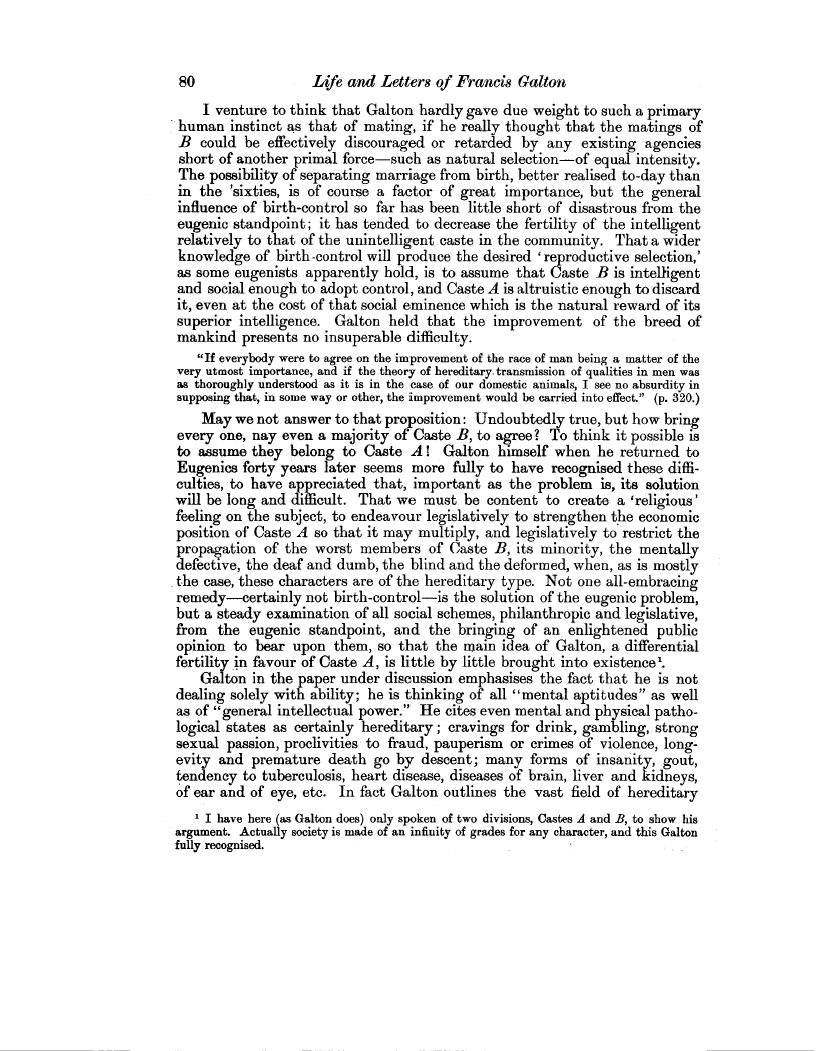80 Life and Letters of Francis Galton
I venture to think that Galton hardly gave due weight to such a primary human instinct as that of mating, if he really thought that the matings of B could be effectively discouraged or retarded by any existing agencies short of another primal force-such as natural selection-of equal intensity. The possibility of separating marriage from birth, better realised to-day than in the 'sixties, is of course a factor of great importance, but the general influence of birth-control so far has been little short of disastrous from the eugenic standpoint; it has tended to decrease the fertility of the intelligent relatively to that of the unintelligent caste in the community. That a wider knowledge of birth-control will produce the desired `reproductive selection,' as some eugenists apparently hold, is to assume that Caste B is intelligent and social enough to adopt control, and Caste A is altruistic enough to discard it, even at the cost of that social eminence which is the natural reward of its superior intelligence. Galton held that the improvement of the breed of mankind presents no insuperable difficulty.
"If everybody were to agree on the improvement of the race of man being a matter of the very utmost importance, and if the theory of hereditary. transmission of qualities in men was as thoroughly understood as it is in the case of our domestic animals, I see no absurdity in supposing that, in some way or other, the improvement would be carried into effect." (p. 320.)
May we not answer to that proposition: Undoubtedly true, but how bring every one, nay even a majority of Caste B, to agree? To think it possible is to assume they belong to Caste A ! Galton himself when he returned to Eugenics forty years later seems more fully to have reconised these difficulties, to have appreciated that, important as the problem' is, its solution will be long and difficult. That we must be content to create a `religious' feeling on the subject, to endeavour legislatively to strengthen the economic position of Caste A so that it may multiply, and legislatively to restrict the propagation of the worst members of Caste B, its minority, the mentally defective, the deaf and dumb, the blind and the deformed, when, as is mostly .the case, these characters are of the hereditary type. Not one all-embracing remedy-certainly not birth-control-is the solution of the eugenic problem, but a steady examination of all social schemes, philanthropic and legislative, from the eugenic standpoint, and the bringing of an enlightened public opinion to bear upon them, so that the main idea of Galton, a differential fertility in favour of Caste A, is little by little brought into existence 1.
Galton in the paper under discussion emphasises the fact that he is not dealing solely with ability; he is thinking of all "mental aptitudes" as well as of "general intellectual power." He cites even mental and physical pathological states as certainly hereditary ; cravings for drink, gambling, strong sexual passion, proclivities to fraud, pauperism or crimes of violence, longevity and premature death go by descent; many forms of insanity, gout, tendency to tuberculosis, heart disease, diseases of brain, liver and kidneys, of ear and of eye, etc. In fact Galton outlines the vast field of hereditary
1 I have here (as Galton does) only spoken of two divisions, Castes A and B, to show his argument. Actually society is made of an infinity of grades for any character, and this Galton fully recognised.

